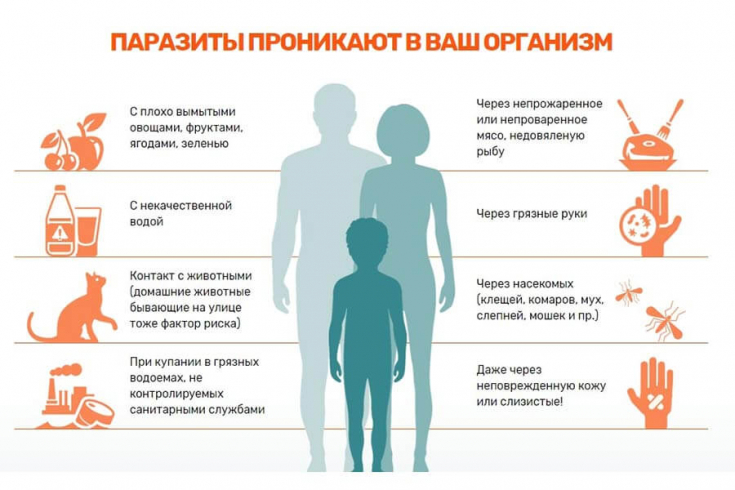According to doctors, more than 80% of children aged 1.5-3 years have infection with worms. Such a prevalence is easily explained: helminths, which belong to parasitic worms, have a high level of adaptability and are able to wait in the wings for years in the form of eggs or cysts, so that then, together with street shoes or vegetables and fruits, "come" in your home. A small child, not yet able to adhere to the rules of personal hygiene, is most vulnerable to infection.
Therefore, it is important to get regular check-ups for helminthiasis and not hope that the absence of pets in your home guarantees safety.
But how to understand if the infection still happened? About signs of worms in children and treatment methods, read in our article.
- Signs of worms in a child: what what to look for
- How to treat worms in a child and not harm his health
Signs of worms in a child: what to pay attention to
One of the most insidious properties of helminthiasis is its ability to do nothing for a long time. And & nbsp; even when the number of worms reaches a huge scale, the symptoms of helminthiasis can mimic signs of other diseases. Therefore, many parents do not even realize that the child's endless health problems can have a "parasitic" reason.
Pay attention to the following manifestations of possible helminthiasis:
-
Itching in anal region. This symptom is characteristic of pinworm infection and is most pronounced at night. You can notice this both by direct manifestations (the child is constantly trying to scratch between the buttocks) and indirectly (the child's sleep is severely disturbed, he often wakes up and is naughty).
-
Decreased immunity. The child's tendency to colds increases even in the off-season. Sometimes it is enough for him to drink cold water or take a walk in windy weather to get a runny nose, fever and a sore throat or cough.
-
Symptoms of general intoxication. Waste products of worms have a toxic effect on the body. The child becomes drowsy, gets tired quickly, complains of body aches and headaches. Children who do not yet know how to speak well and express their complaints may show this by refusing to outdoor games, severe lethargy.
-
Lack of body weight. Helminths consume a huge amount of nutrients that enter the body along with food. Accordingly, the child, along with normal nutrition, is underweight. But with helminth intoxication, appetite can greatly decrease, which creates even more problems: a child may develop severe beriberi, mineral deficiency and related symptoms (brittle hair and nails, multiple caries, disorders in the musculoskeletal system and others ).
-
Other symptoms.Depending on the type of parasites and their quantity other signs of helminthiasis may also be observed. Among them — teeth grinding at night, cramps in the calf muscles, allergic reactions, stool disorders (constipation, diarrhea or alternation of these conditions), complaints of abdominal pain, frequent relapses of chronic diseases or their more severe course.

Even a single symptom from the listed list should cause alertness. Especially if the child plays in the common sandbox, attends a kindergarten or school, spends the weekend in the country, is not accustomed to washing his hands before eating, or there are other circumstances that increase the risk of helminth infection.
Read also: Dangers for your child: children's sandbox
How to treat worms in a child and not harm his health
Many parents try to use folk remedies for the treatment of helminthiasis — microclysters with milk and garlic, a decoction of pumpkin seeds and other recipes. But such methods are extremely rarely effective, since they act only in a limited area of the digestive system: causing the death of parasites that are in the rectum, they have no effect on the helminths that have occupied the large and small intestine.
Read also: Bruxism in children: why a child grinds his teeth in sleep and what to do about it
In addition, infection with several types of worms is often encountered, which requires treatment with various means, which is very difficult in the case of a small child.
Therefore, use the following simple algorithm, which will ensure that you get rid of worms:
-
Get an examination. One stool test for worm eggs is not enough, you need to conduct at least 3 studies: after the first analysis — 5 days, and 10 days after the second. This will make it possible to detect the eggs of worms of different species (if any), since the laying of eggs in different species occurs at different intervals.
-
Treat helminthiasis only with drugs prescribed by a doctor and only in the recommended dosage this is how they cause the death of parasites. And only a doctor can choose a remedy that is safe for a child of a particular age and taking into account the peculiarities of the clinical picture.
- , as cross-infection of worms between parents and children is very common.

Examination should be done twice in a year — in mid-spring and in mid-autumn. At an older age, when the child has already learned to comply with the requirements for personal hygiene, one examination per year or as needed will be enough.
Read also:
How to evict worms from the body: effective tipsYou may be interested in: Stone massage or stone massage - what is it? Watch the video.







